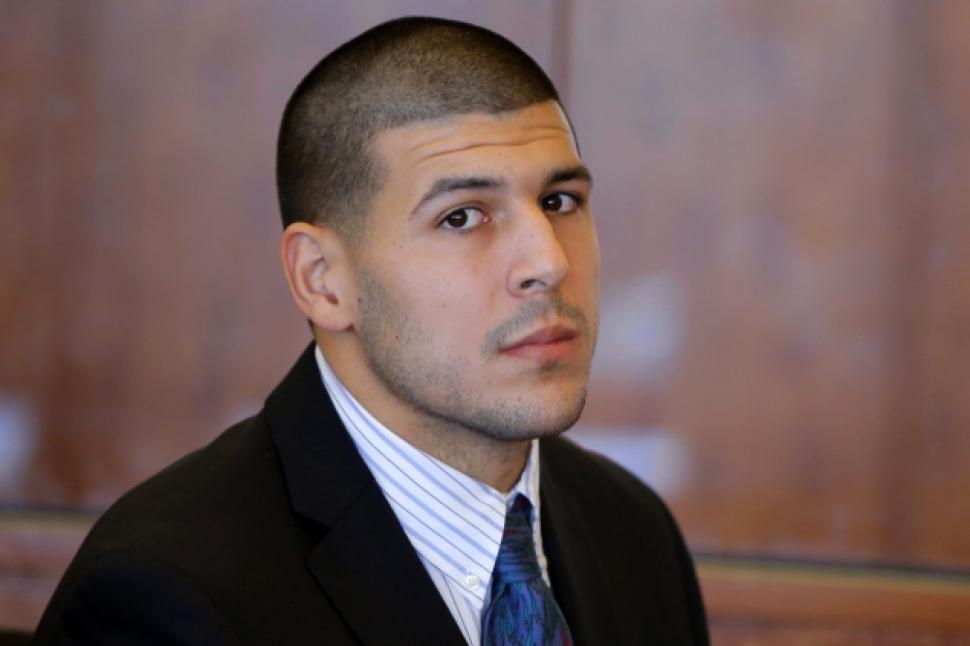By Jose Castillo, news correspondent
Former New England Patriots tight end Aaron Hernandez was found guilty Wednesday morning on a smattering of charges relating to the 2013 murder of semi-professional football player Odin Lloyd. Despite lacking a motive, eyewitness and murder weapon, the jury found Hernandez guilty of first-degree murder.
Hernandez, who had a $40 million contract with the Patriots at the time of the murder, was also convicted on gun charges. The jury deliberated for 34 hours.
The two-month long testimony featured hundreds of witnesses – 132 called in by the prosecution alone. Though Hernandez’s fiancée, Shayanna Jenkins, burst into tears when the verdict was announced, she testified with immunity for the prosecution. Hernandez had pleaded not guilty.
The trial, which started in January, focused primarily on circumstantial evidence, as a key component of the investigation – the murder weapon – has not been found. Instead, videos taken from Hernandez’s home and an industrial park near Attleboro, along with DNA evidence found on a marijuana joint, placed Hernandez as the primary suspect.
According to the prosecution, Hernandez and two accomplices picked up Lloyd at his home in Boston late the night of June 17, 2013. Reading the situation, Lloyd texted his sister to note the people he was with that night, specifically Hernandez himself. Hernandez, Lloyd and the others then rode to an industrial park in Attleboro, where Lloyd was shot execution-style and later discovered by a jogger and local construction workers.
Testimonies and evidence showed the murder was due to conflict between Hernandez and Lloyd after Lloyd was seen talking to people Hernandez dislikes at a Boston club.
Video footage from Hernandez’s home in North Attleboro showed Hernandez’s next moves a few minutes after the murder occurred. While the prosecution provided detailed video analysis of film containing Hernandez holding a murder weapon, the defense argued that the undefinable group of pixels held by Hernandez was simply an iPad.
Witnesses were widely varied, ranging from house cleaners who worked for Hernandez to Patriots owner Robert Kraft. Jenkins was given special immunity to testify in the trial, as she also faces charges herself stemming from video footage that shows her disposing of a black bag the prosecution believes contained the murder weapon.
Students responded almost unanimously in their disappointment with Hernandez’s actions.
“It’s kind of sad that a talented athlete is still held back by the settings of his youth,” freshman computer science and business major and avid Patriots fan Kurran Singh said, referring to Hernandez’s turbulent upbringing. “Athletes are still people.”
Freshman chemical engineering major Michael Lanzillotti does not believe that Hernandez’s actions are a reflection of the Patriots team, referring to Patriots Head Coach Bill Belichicks’ alleged cheating.
“I think the organization is pretty well-removed from the beginning,” Lanzillotti said. “There’s the characters of those who play the game, and then there’s discrepancies between rules in the game, which are two very different things. Aaron Hernandez murdered a guy, Bill simply bends the rules,” he said.
Freshman electrical engineering major Vladislav Martin disagreed, saying that public views of Hernandez’s actions are inherently tied to those of the Patriots organization, since professional athletes hold a special responsibility within a community.
“Professional athletes are paid to perform and represent their community, and if they mess up, they discredit the community and the organization they come from,” Martin said. “I mean, look at Ray Rice. Now no one likes the Ravens as much anymore.”
In Massachusetts, a first-degree murder conviction carries an automatic sentence of life in prison without the possibility of parole.Hernandez also faces charges in a double homicide which occurred in 2012 and a lawsuit stemming from a 2013 incident in Miami.
Photo courtesy NY Daily News









